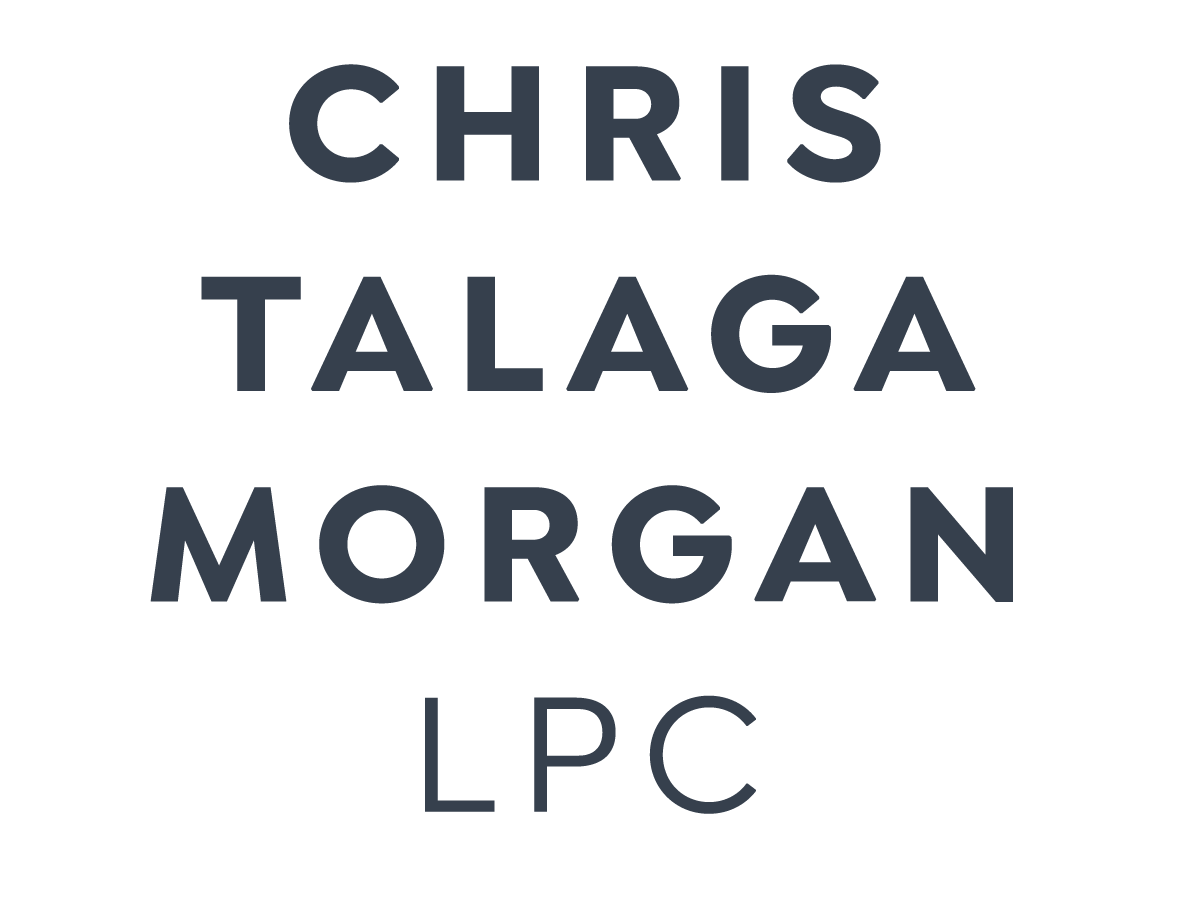
CHRIS TALAGA MORGAN
Welcome
I believe that emotional discomfort is often an unwillingness to commit to the truth of experience in the present moment. This experience is often not convenient and difficult to tolerate. The truth can provoke anxiety, create moods that are difficult to tolerate and make everyday life circumstances feel unbearable.
A common cause of this discomfort originates from our stories and interpretations about the experiences and events in our lives. I work with clients by using a combination of mindfulness (a non-judgmental state of awareness) and EMDR (Eye Movement Desensitization and Reprocessing). This approach helps clients observe, acknowledge, and begin to tolerate and co-exist more peacefully with these disquieting feelings and physical sensations. EMDR can help “rewire” the way people integrate their stories and interpretations and helps to give a new experience of past events.
My professional style, informed by 25 years of clinical experience, is goal-oriented and direct, which translates to working in a time-limited way. We work collaboratively to create a set of workable goals and each session is geared to actualizing those goals.
AREAS OF SPECIALIZATION
- EMDR
- Grief and loss
- Anxiety / OCD / Mood disorders
- ADHD / ADD
- Chronic health issues
- Transitions- college, parenthood, perimenopause
- Internal Family Systems informed
- Spirituality
- Trauma / PTSD
CREDENTIALS
- Master of Counseling Psychology, University of Denver, 1996
- Bachelor of Psychology, University of Kansas, 1994
- Licensed in Colorado : L.P.C. #2141, 1999
- EMDR Level II Trained 2005
CLINICAL EXPERIENCE
- Human Services Incorporated, Employee Assistance Program 1997-1998
- St. Vrain Valley School District, Intervention Specialist 1998-2001
- St. Vrain Valley School District, School Counselor 2001-2005
- Jefferson County Human Services, Intensive Family Treatment Team2005-2007
- Private Practice Boulder County 2008-currrent
- Boulder County Employee Assistance Program trainer / group facilitator 2009-current
Eye Movement Desensitization & Reprocessing (EMDR)
EMDR is a therapeutic strategy that has been very successful in helping people who struggle with anxiety and other emotional disturbances. In my practice, I have successfully treated clients suffering with low-self esteem, depression, anxiety and panic disorders, sleep disturbances, and other issues using EMDR.
Here is some helpful information:
After much research, it has been realized that EMDR is very successful in treating anxiety as well as many other issues. It was first used and researched with Post Traumatic Stress Disorder (PTSD) with war veterans.
Through accessing the nervous system, we tap into a healing process that the body already does naturally. The body is designed with the ability to heal itself. When you get a cut, you don’t have to think your way through healing the cut. The body already knows what it wants to do.
A similar response happens when the therapeutic strategy EMDR is applied. When the brain and body know what information to work on, the healing happens naturally. The body will keep the information it finds helpful and heal (or release) the information that it finds unhelpful.
EMDR can be thought of as accessing old experiences or beliefs that happened earlier at some point in life and reorganizing the information so that it can be filed more appropriately. Irrational beliefs form out of emotional experiences at any point in life – be it from childhood trauma or from situations that occurred as an adult. Feelings such as of being out of control or not being safe in a situation will leave a lasting impression. Often this results in symptoms of depression and anxiety. This information gets stored in a separate filing cabinet in the mind. The problem lies in the fact that those old beliefs act like a filter for future experiences and cause emotional disturbance later in life.
EMDR allows both sides of the adult brain the access the information in that separate filing cabinet and reorganizes it so that it can be filed more appropriately. Information becomes filed with no emotion attached and the intensity is released. Any disturbing memories or thoughts become filed like an old memory and can be set aside.
Memories, body sensations, or beliefs that cause distressing emotional responses (what one might call being triggered), are reprocessed and become restored into healthy, nondistressing form. We become informed by our memories, not controlled by them.

Parnell, L. (2007). A Therapist’s Guide to EMDR. New York: W.W. Norton & Company Inc.
Shapiro, F. (2001). Eye Movement Desensitization and Reprocessing. New York: The Guilford Press.
Shapiro, F. & Forrest, M.S. (1997). Eye Movement Desensitization and Reprocessing: The Breakthrough “Eye Movement” Therapy for Overcoming Anxiety, Stress, and Trauma. New York: Basic Books.
Highly recommend Christine & EMDR
“EMDR gives me the space I need to focus on my emotions and understand them fully. I can more easily process traumas and start to move on. The connections I’ve made to present and past experiences is astounding. I am empowered by my ability to get to know myself better, and that empowerment stays with me when I leave Christine’s office. Now, when I react to new stressors, I’m more self aware and can more easily identify why I’m reacting in certain ways. I’ve become far more secure and happy.”
Kara I Sep 2, 2019
Excellent
“Christine is nothing short of excellent, and is a wonderful support in my life. Talking through life’s ‘happenings’ with her and hearing her even-keeled, grounded suggestions for response and reaction as appropriate, along with reflections, is a critical positive influence in my life. Highly recommend.”
Kelly W Aug 22, 2019
Can’t recommend highly enough
“Christine is very impactful, as she creates action items every week and ensures practical steps are happening. She also follow my agenda not her own, which can be hard to find with talk therapy. She is warm, direct and firm in her guidance and I have learned/grown more this year than I could have imagined walking in to our first session.”
Meagan M Nov 7, 2018
Exceptional Results with EMDR and Talk Therapy
“Christine is a very gifted practitioner: empathetic but challenging, patient but inquiring. She is comfortable shifting methods as needs/situation change. I started as a talk therapy patient dealing with anxiety and started EMDR and have enjoyed excellent results via this combination. One size doesn’t fit all with Christine. I would highly recommend Christine to anyone actively seeking change in their wellbeing.”
6-month Patient Mar 24, 2017
New Clients
Please send a message using the contact form.
Current clients: Book an Appointment
Want to support your mental health and wellness through food and nutrition? Learn more here.



